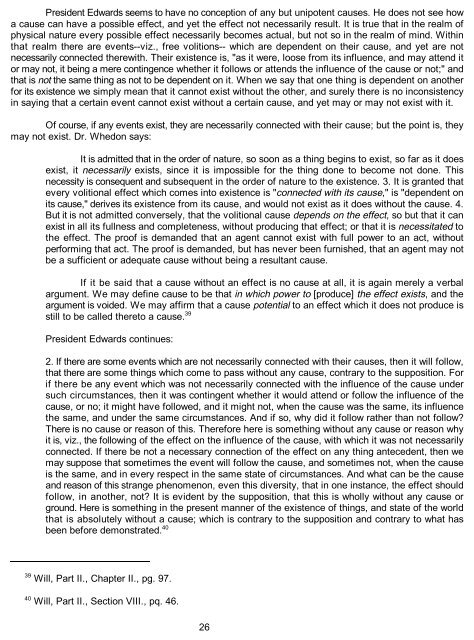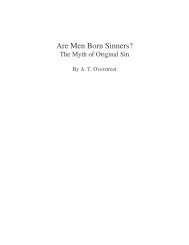Foreknowledge by Joel Hayes - Library of Theology
Foreknowledge by Joel Hayes - Library of Theology
Foreknowledge by Joel Hayes - Library of Theology
Create successful ePaper yourself
Turn your PDF publications into a flip-book with our unique Google optimized e-Paper software.
President Edwards seems to have no conception <strong>of</strong> any but unipotent causes. He does not see how<br />
a cause can have a possible effect, and yet the effect not necessarily result. It is true that in the realm <strong>of</strong><br />
physical nature every possible effect necessarily becomes actual, but not so in the realm <strong>of</strong> mind. Within<br />
that realm there are events--viz., free volitions-- which are dependent on their cause, and yet are not<br />
necessarily connected therewith. Their existence is, "as it were, loose from its influence, and may attend it<br />
or may not, it being a mere contingence whether it follows or attends the influence <strong>of</strong> the cause or not;" and<br />
that is not the same thing as not to be dependent on it. When we say that one thing is dependent on another<br />
for its existence we simply mean that it cannot exist without the other, and surely there is no inconsistency<br />
in saying that a certain event cannot exist without a certain cause, and yet may or may not exist with it.<br />
Of course, if any events exist, they are necessarily connected with their cause; but the point is, they<br />
may not exist. Dr. Whedon says:<br />
39<br />
Will, Part II., Chapter II., pg. 97.<br />
40<br />
It is admitted that in the order <strong>of</strong> nature, so soon as a thing begins to exist, so far as it does<br />
exist, it necessarily exists, since it is impossible for the thing done to become not done. This<br />
necessity is consequent and subsequent in the order <strong>of</strong> nature to the existence. 3. It is granted that<br />
every volitional effect which comes into existence is "connected with its cause," is "dependent on<br />
its cause," derives its existence from its cause, and would not exist as it does without the cause. 4.<br />
But it is not admitted conversely, that the volitional cause depends on the effect, so but that it can<br />
exist in all its fullness and completeness, without producing that effect; or that it is necessitated to<br />
the effect. The pro<strong>of</strong> is demanded that an agent cannot exist with full power to an act, without<br />
performing that act. The pro<strong>of</strong> is demanded, but has never been furnished, that an agent may not<br />
be a sufficient or adequate cause without being a resultant cause.<br />
If it be said that a cause without an effect is no cause at all, it is again merely a verbal<br />
argument. We may define cause to be that in which power to [produce] the effect exists, and the<br />
argument is voided. We may affirm that a cause potential to an effect which it does not produce is<br />
still to be called thereto a cause. 39<br />
President Edwards continues:<br />
2. If there are some events which are not necessarily connected with their causes, then it will follow,<br />
that there are some things which come to pass without any cause, contrary to the supposition. For<br />
if there be any event which was not necessarily connected with the influence <strong>of</strong> the cause under<br />
such circumstances, then it was contingent whether it would attend or follow the influence <strong>of</strong> the<br />
cause, or no; it might have followed, and it might not, when the cause was the same, its influence<br />
the same, and under the same circumstances. And if so, why did it follow rather than not follow?<br />
There is no cause or reason <strong>of</strong> this. Therefore here is something without any cause or reason why<br />
it is, viz., the following <strong>of</strong> the effect on the influence <strong>of</strong> the cause, with which it was not necessarily<br />
connected. If there be not a necessary connection <strong>of</strong> the effect on any thing antecedent, then we<br />
may suppose that sometimes the event will follow the cause, and sometimes not, when the cause<br />
is the same, and in every respect in the same state <strong>of</strong> circumstances. And what can be the cause<br />
and reason <strong>of</strong> this strange phenomenon, even this diversity, that in one instance, the effect should<br />
follow, in another, not? It is evident <strong>by</strong> the supposition, that this is wholly without any cause or<br />
ground. Here is something in the present manner <strong>of</strong> the existence <strong>of</strong> things, and state <strong>of</strong> the world<br />
that is absolutely without a cause; which is contrary to the supposition and contrary to what has<br />
been before demonstrated. 40<br />
Will, Part II., Section VIII., pq. 46.<br />
26






